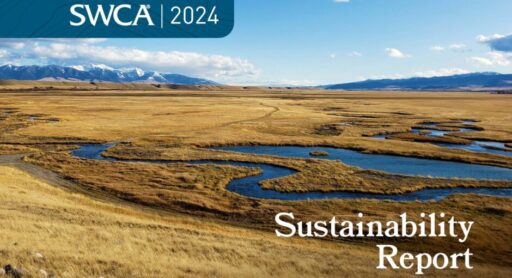2025
Comparably’s Best Company Outlook
* Providing engineering services in these locations through SWCA Environmental Consulting & Engineering, Inc., an affiliate of SWCA.

From the experts we hire, to the clients we partner with, our greatest opportunity for success lies in our ability to bring the best team together for every project.
That’s why:

At SWCA, sustainability means balancing humanity’s social, economic, and environmental needs to provide a healthy planet for future generations.
SWCA employs smart, talented, problem-solvers dedicated to our purpose of preserving natural and cultural resources for tomorrow while enabling projects that benefit people today.

At SWCA, you’re not just an employee. You’re an owner. Everyone you work with has a stake in your success, so your hard work pays off – for the clients, for the company, and for your retirement goals.
Supreme Court Decision in Sackett v. EPA Narrows Definition of Jurisdictional Wetlands
On May 25, 2023, the U.S. Supreme Court issued the long-anticipated Sackett v. EPA decision narrowing the interpretation of federal waters of the United States (WOTUS).
Erica has 20+ years of experience leading program and project teams in water quality, water resources planning, and water policy. She ensures that SWCA delivers high quality work products across the water resources service area.

Nathan Jones is a Principal Environmental Consultant who oversees and manages renewable energy development projects. His extensive experience includes supporting, permitting, and managing projects on federal, state, and private lands. Nathan is well-versed in regulatory frameworks such as FAST-41 (Title 41 of the Fixing America’s Surface Transportation (FAST) Act), NEPA, ESA, CWA, and NHPA, along with state and local regulations. Additionally, he offers technical assistance to other project managers in the renewable energy sector.



On May 25, 2023, the U.S. Supreme Court issued the long-anticipated Sackett v. EPA decision narrowing the interpretation of federal waters of the United States (WOTUS). Specifically, the court determined that wetlands on the Sackett property, located in northern Idaho, were not subject to federal Clean Water Act (CWA) regulations because they are distinguishable from any other jurisdictional water. In essence, the opinion determined that the Clean Water Act extends to only those wetlands with a “continuous surface connection to bodies that ‘are Waters of the United States’ in their own right,” so that they are ”indistinguishable” from those waters. In addition, the decision abandons the existing significant nexus test for adjacent wetlands moving forward.
Five justices provided the majority opinion that federal CWA authority does not extend to adjacent wetlands lacking an “indistinguishable continuous surface connection” to waters, and ultimately a traditional navigable water. However, wetlands with a continuous surface connection will remain jurisdictional under the CWA. The decision relies primarily on the CWA congressional statute as a basis for why certain adjacent wetlands should not be included in the definition of WOTUS. Four justices concurred with the decision for the Sackett property but disagreed with the test that adjacent wetlands must have an indistinguishable continuous surface connection or be adjoining to be considered waters with federal jurisdiction. These justices expressed concerns about nationwide impacts on water quality and flood control.
The definition of Waters of the United States (WOTUS) has been debated since the adoption of the Clean Water Act in 1972. Regulatory agencies and courts, including the Supreme Court, have made numerous efforts to interpret the jurisdictional reach of WOTUS under the CWA. Overall, the Sackett v. EPA decision results in a narrowing of WOTUS under the regulatory agencies’ authority to regulate wetlands.
The Sackett v. EPA opinion also emphasizes statutory language in the CWA that protects the “primary responsibilities and rights of States” to reduce water pollution and to manage land and water resources.
The court remanded the matter back to the Ninth Circuit court for further proceedings consistent with this opinion. The decision is inconsistent with the most recent “Revised Definition of ‘Waters of the United States’” rule that took effect on March 20, 2023, as well as the pre-2015 CWA regulatory regime, both of which are in effect in different states. Thus, we expect to see further activity in the courts and by the agencies (EPA and the U.S. Army Corps of Engineers) to resolve this inconsistency.
We expect to see further clarification in the coming months from the courts and the agencies on how this new decision will be implemented across Clean Water Act programs that affect the regulated community. If your project has the potential to impact aquatic resources (e.g., wetlands, streams, lakes, etc.) it is important to consider not only the federal jurisdictional status of the aquatic resources in question but also state and local regulations. Many states and localities across the U.S. have their own specific regulations. These regulations may require additional permitting and or setbacks from aquatic resources.
For more information, you can read the detailed Sackett v. EPA opinion here. If you have questions about how this decision affects your project, please reach out to your SWCA project manager.